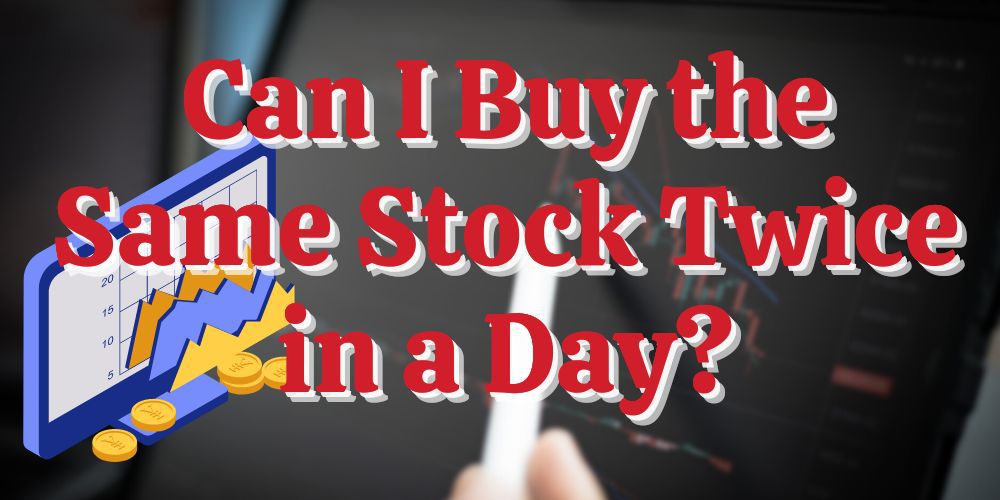Day trading is not for the faint of heart. There are even regulations in place to stop retail investors from doing it.
However, what about buying the same stock twice in a day? Is that barred too? We take a look at these answers below.
Can I Buy the Same Stock Twice in a Day?
There are no restrictions on buying the same stock more than once during a single trading day.
However, it is a different story when the said stock is both bought and sold repeatedly.

This kind of transaction is called day trading.
Due to the highly risky nature of such an investing style, the Financial Industry Regulation Authority (FINRA) has barred ordinary investors from it.
How Many Times Can I Buy the Same Stock?
You can buy the same stock as many times as you’d like on the same trading day. There are no limitations to doing it.
The reverse is also true – folks can sell stock multiple times a day.
However, as a retail investor, it is not possible to do more than four buy-and-sell transactions of the same stock over a five trading day period.
Only recognized pattern day traders (or, more commonly, day traders) can do this.
Other folks who try it might find their accounts frozen by their brokerage firms.
Can I Buy and Sell the Same Stock Repeatedly?
As explained above, buying and selling stocks of the same firm more than four times over five business days is not allowed for ordinary investors.
Only day traders are eligible to do it.
Moreover, such investing is restricted to margin account holders. Those with a cash account are not eligible for it.
Those who are allowed to carry out day trades are classified separately by their brokerage firms.
Their accounts are not subjected to this regulation.
Additionally, pattern day trading is extremely risky.

It requires a degree of technical skill to recognize stock movements and take positions accordingly.
Even then, there is a lot of speculation involved.
Hence, only stock market experts who understand the ins and outs of how it works are allowed by the authorities to day trade.
Such investors use advanced technical analysis to set up positions.
They also make sure to close out the holdings on the same day before closing.
However, there is one small loophole around this regulation for regular traders, which we discuss next.
The Two-Hour-a-Day Trading Plan
Small traders are allowed to buy a financial security towards the end of the day’s trading and sell it early on during the next day.
This is often referred to as the “two-hour-a-day trading” plan.
It allows one to hold a stock for less than 24 hours without breaking the rule.
A very common use of this strategy is when a company’s results are expected to come out after the close of the day.
If they are likely to create a huge surge the next morning, buying before the announcement could be beneficial.
The trader can sell stocks on the following day and book a profit.
However, as explained earlier, it is very risky for small traders to indulge in day trading.
The best idea is to use limit orders to protect against speculative risk.
These let the trader decide a set value at which they want to trade.
Until the limit price is reached, such orders do not get executed.
What Is Wash Trading?
Wash trading is an investing strategy designed to mislead other market participants.
Initially, a big investor indicates that they are interested in buying (or selling) a large quantity of a particular share.
The purpose is to let folks believe that the stock price might be about to move in a certain direction.
Observing this, other traders then start modifying their positions in line with the large trader.
This creates a snowball effect as the price continues to rise higher.

After a while, the wash trader would short the stock.
At this point, due to the increases in price, they make a killing by exiting the market.
Unfortunately for the rest of the traders, the stock returns to its inherent value, leaving some of them with losses.
This practice might involve either the same trader acting as both buyer and seller or sometimes a broker may collude with them.
Is It Illegal?
Yes, wash trading is barred by several regulatory authorities.
It was first disallowed in 1936 under the Commodity Exchange Act.
The Commodity Futures Trade Commission (CFTC) has also barred brokers from profiting through such trades.
They are held accountable even if they deny having knowledge of the trade.
The law puts the onus of conducting due diligence on the trader on them.
Lastly, the IRS prohibits traders from using losses generated in a wash sale for deductions in capital gains tax.
Any trades that substantially cancel each other out within 30 days are not eligible for taxation rebates.
Despite all said rules, there are large entities on stock markets that can still use this practice for their benefit.
For example, high-frequency trading has been under the scanner since 2013 for this practice.
Cryptocurrencies are perhaps the most recent frontier where it has reared its ugly head.
In fact, a Forbes study reported that nearly half of Bitcoin volumes are fake or wash trading based.
These coins are very susceptible to pump-and-dump schemes.
This is a combination of a high-volume wash trade strategy with coin publicity from “star” crypto traders.
Final Thoughts
There is no restriction on buying stocks many times a day. Neither is selling them in multiple transactions barred in any way.
However, retail traders are disallowed from performing both buying and selling transactions multiple times on the same day.
If they try to do it beyond four trades in a five-day period, their accounts are liable to be frozen.
Only a day trader is eligible for doing such transactions. These folks are expert players who understand the risks and rewards of this strategy.
And, it’s important to remember that repeated buying and selling can be misused by large traders to mislead others into overestimating the value of a security.
This practice is known as a wash sale and is prohibited by financial regulatory authorities.


 Tags:
Tags:










